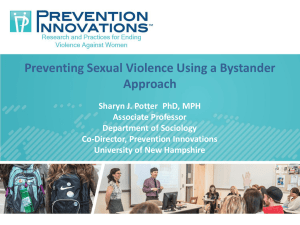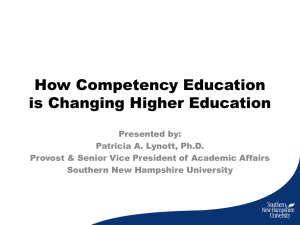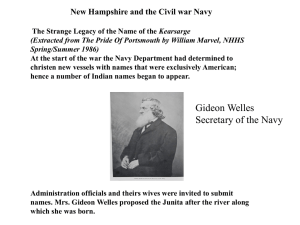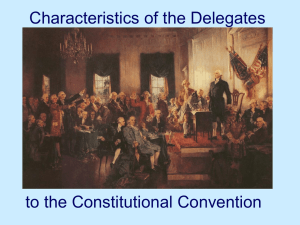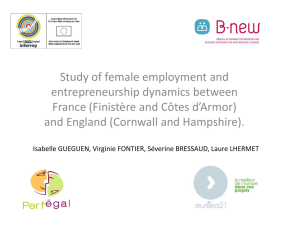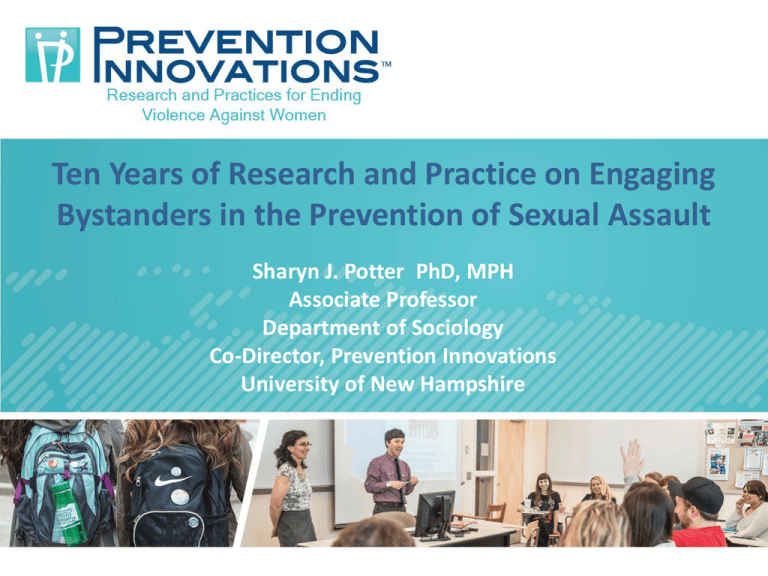
Ten Years of Research and Practice on Engaging
Bystanders in the Prevention of Sexual Assault
Sharyn J. Potter PhD, MPH
Associate Professor
Department of Sociology
Co-Director, Prevention Innovations
University of New Hampshire
A Bystander Approach
© 2014 University of New Hampshire. All Rights Reserved.
2
Two Bystander Prevention
Strategies:
The Bringing in the Bystander®
In-Person Prevention Program
The Know Your Power® Bystander
Social Marketing Campaign
© 2014 University of New Hampshire. All Rights Reserved.
3
Rape on US University Campuses*
• Public Health Issue
• Economic Issue
• Community Issue
* Over 25 years of incidence and prevalence studies beginning
with research by Koss, Gidycz and Wisiewski published in 1987.
© 2014 University of New Hampshire. All Rights Reserved.
Recent U.S. Legislation to Address
Sexual Violence on University and
College Campuses
• 2011 Amendments to Title IX, Dear
Colleague Letter
• Campus saVE Act
• White House Task Force to Prevent
Students from Sexual Assault, Not Alone
© 2014 University of New Hampshire. All Rights Reserved.
Campus Responses
© 2014 University of New Hampshire. All Rights Reserved.
6
Programs from a “Box”
© 2014 University of New Hampshire. All Rights Reserved.
7
Not So Fast…
© 2014 University of New Hampshire. All Rights Reserved.
8
More Harm than Good?
• Are the programs evidenced based?
• Do the programs reiterate the current rape
culture?
• Do the programs draw from the research on
learning?
• No magic bullets.
© 2014 University of New Hampshire. All Rights Reserved.
9
10 Years of Research on Bystander
Intervention
What we know……
• Engage target audience members
• Social Self-Identification: audience need to
see themselves, familiar contexts and speech
• Need to engage all community members
• Programs need to be evaluated
© 2014 University of New Hampshire. All Rights Reserved.
10
Specific Lessons - Engage the
Target Audience
© 2014 University of New Hampshire. All Rights Reserved.
Specific Lessons
Social Self-Identification
© 2014 University of New Hampshire. All Rights Reserved.
12
Focus Group Exercise
Example of an Individual Response
© 2014 University of New Hampshire. All Rights Reserved.
Specific Lessons - Language
WE DO NOT TALK LIKE THE PEOPLE IN THE
IMAGE!
• Replace the “nailed” with “smashed.”
• Replace rape with “Do you know how many
years you’ll get?” or “he could go to the big
house.”
• Replace Alex, Emma, Kyle and Angela to
names like Kiesha, Jamal, Tyrone and Brittany.
© 2014 University of New Hampshire. All Rights Reserved.
Specific Lessons – Familiar Context
Three men gang raped
a woman in 1987 in
Stoke Hall, a
residence hall at UNH.
Multiple bystanders
witnessed this crime
and did not intervene.
© 2014 University of New Hampshire. All Rights Reserved.
16
Specific Lessons
Engage All Community Members
• Example from a pilot study at two Army
Posts in Europe (USAREUR).
• We had the opportunity to adapt both our inperson program and our social marketing
campaign.
© 2014 University of New Hampshire. All Rights Reserved.
17
Know Your Power Bystander Social Marketing Campaign
USAREUR Pilot Results
• 146 Soldiers on the post completed the survey
following the removal of the images.
• 77% reported seeing image, 23% did not see
images.
Saw Images
(N = 112)
88% male
66% lived on post
Did Not See Images
(N=34)
71% male*
62% lived on post
© 2014 University of New Hampshire. All Rights Reserved.
USAREUR Pilot Study of the Know Your Power
Bystander Social Marketing Campaign
Results
Soldiers who saw campaign images are
significantly less likely to report that
reducing sexual assault and stalking is
the responsibility of someone else (e.g.
sexual assault response coordinator,
SARC, police), (p < .05).
(Potter & Stapleton, 2012)
© 2014 University of New Hampshire. All Rights Reserved.
Soldier’s Outcomes Five Months after Participating
in the Bringing in the Bystander Training.
These results are significant (p < .001).
© 2014 University of New Hampshire. All Rights Reserved.
Program Evaluation
1. Formative evaluation during program
development (e.g., focus groups,
surveys).
2. Pretest and posttest methodologies, 5
week, 6 month and 12 month followup surveys.
3. Engage our target audience members
to determine incentives that will
increase and retain study
participation.
© 2014 University of New Hampshire. All Rights Reserved.
Example of Campaign Administration and
Evaluation
Copyright
23
Campus Wide Evaluation: Research
Questions
Does exposure to the Know Your Power Bystander
Social Marketing Campaign change students’
attitudes regarding sexual assault, relationship
violence and stalking?
Stage of Change Scale
• Precontemplation
• Contemplation
• Action
Backlash?
•
Are we making things worse?
Potter SJ. “Using a Multi-media Social Marketing Campaign to Increase Active Bystanders on
the College Campus.” Journal of American College Health 60, 2012, 282-295.
A Few Results….
• Decrease in the belief that preventing sexual violence
is the responsibility of others between pretest and
posttest times (Main effect for time, F 1, 333, p < .05, Between subject effect for
gender, F
1, 331,
p < .001)
• Increase in participants’ willingness to prevent sexual
and relationship violence and stalking & social selfidentification between pretest and posttest times (Main
effect for time, F
1, 333,
p < .05, Between subject effect for gender, F
1, 331,
p < .001)
• Participants reported taking increase in actions to
reduce sexual and relationship violence and stalking
and campaign exposure between prestest and posttest
times. (Main effect for time: F 1, 332, p < .001)
© 2014 University of New Hampshire. All Rights Reserved
25
Know Your Power Bystander Social Marketing Campaign
Evaluation Results from 5 Campus Studies
• Social marketing changes attitudes.
• Changes in attitudes and behavior between
pretest and posttest times.
• Importance of social self-identification.
• Dose matters (intentional & time limited).
• Effects maintained 5 weeks following
end of exposure.
• No backlash effect.
Still More Questions???
1. Does the intervention reduce
perpetration rates?
2. Does the intervention reduce rates
of victimization?
© 2014 University of New Hampshire. All Rights Reserved
27
Need Different Strategies
• One prevention dosage will not end
perpetration and victimization.
© 2014 University of New Hampshire. All Rights Reserved
28
Education Needs to Begin Before
Students Enter College and University
© 2014 University of New Hampshire. All Rights Reserved
29
In Conclusion…
© 2014 University of New Hampshire. All Rights Reserved
30
Thank You.
Please contact me with any questions…
Sharyn.Potter@unh.edu
Sharyn J. Potter PhD, MPH
Associate Professor
Department of Sociology
Co-Director, Prevention Innovations
University of New Hampshire

